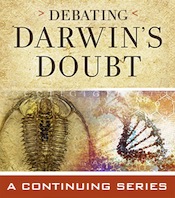 Evolution
Evolution
 Intelligent Design
Intelligent Design
Unintended Consequences: How Hostile Responses to Darwin’s Doubt Turned a Thoughtful Reader Against Darwinian Evolution

A bumper sticker I’ve seen around in Seattle protests the War on Terror, warning that “We’re making enemies faster than we can kill them…” Without wading into matters of national defense and military strategy, I’ll give the author of the slogan this much: Any strategy that focuses too much on attacking people, and not enough on making reasoned arguments, is doomed to fail in winning hearts and minds.
For an illustration, take a look at a post by Reverend James Miller, of Glenkirk Church in Glendora, CA. He recently explained that he became a Darwin skeptic not just after reading Darwin’s Doubt, but also after considering responses from critics of the book. Under the title “Changing My Mind on Darwin,” Pastor Miller writes:
I’ve just read Stephen Meyer’s Darwin’s Doubt. Meyer is a Cambridge PhD in philosophy of science. He hangs out with the Intelligent Design people. His writing is fluid, detailed, and reasonable. He seems to know what he’s talking about.
The book makes the case for the fact that the fossil record doesn’t support Darwinism. The sudden appearance of new phyla without sufficient time for the mutation and selection process to work is simply unaccounted for by the rocks.
The problem is that when Meyer says things like, “the Precambrian fossil record simply does not document the gradual emergence of the crucial distinguishing characteristics of the Cambrian animals,” how on earth should I know if he’s right? I don’t have time to immerse myself in paleontology. I’ll never be an expert. I just have four hundred pages of articulate, self-assured, well-documented evidence for Meyer’s case.
 Pastor Miller conveys a sentiment that I think is quite reasonable and fairly common. The debate over Darwinism can be technical and complex. Proponents and opponents of neo-Darwinian theory alike cite evidence for their cases. If you haven’t had the opportunity to study the scientific questions in detail, it can be difficult to know who is right. If you’re not an expert in the science, how can you make an informed decision?
Pastor Miller conveys a sentiment that I think is quite reasonable and fairly common. The debate over Darwinism can be technical and complex. Proponents and opponents of neo-Darwinian theory alike cite evidence for their cases. If you haven’t had the opportunity to study the scientific questions in detail, it can be difficult to know who is right. If you’re not an expert in the science, how can you make an informed decision?
Pastor Miller explains that when he enters a complex debate, he seeks to read arguments from different views. He looks at the evidence and the arguments, but he also tries to determine who is sincere and credible. Does one side make serious arguments, while the other persistently resorts to personal attacks and name-calling? If so, that can tell you something. Miller explains that he seeks to understand who is behaving as if the evidence is on their side, and who is trying to compensate for a weak position:
So here’s how I find my way into a conversation on subjects that are not my primary field of study. I read the reviews that are antagonistic to the source and just look at the logic that’s employed. I find that this often gives me the best read on a work. If the critics are sincere, the reviews are usually precise.
The New Yorker‘s review began with a genetic fallacy, presented arguments that Meyer had refuted without mentioning that Meyer had addressed them, and then deferred to another blogger for the scientific content of the review. It then called Meyer “absurd,” which, given how shoddy the review actually is, was an absurd thing to do.
Then I read the review from which the New Yorker piece got its “science,” which was actually written by a grad student at Berkeley. Now I have to say that Berkeley is, in fact, one of my fields of expertise, and I know exactly how Berkeley grad students go about their “work.” Somehow Berkeley selects the crazies and the militants who show the most promise and then teaches them that knowledge is a completely subjective power tool which should be manipulated by those on an ideological crusade to undermine authority. I’m not kidding. I went to Berkeley. That’s what we did.
What’s interesting about the grad student’s review is that it was posted 24 hours after the release of Meyer’s book, and it’s filled with snark. He’s not having an intelligent conversation, he’s insulting Meyer in order to defend something religiously. In a later, defensive review, the grad student says that he read the book “during lunch.” He read over 400 pages of scientific material during lunch, and then posted an insulting review. He says his detractors are just “slow readers.” People who win speed-reading competitions tend to cover 1,000 words per minute (maybe 4 pages) with 50% comprehension. That level of comprehension is almost useless, and it becomes less useful the more information-rich the content. A book of Meyer’s size would have taken an hour and forty minutes at that pace, with minimal retention, and that’s if you’re not, oh, say, eating lunch. On top of that, the review is almost 10,000 words long, which would take some time to write, making it highly suspicious that the review was written after the book was read and not before, in anticipation of the book’s release.
See, this is how I know who to trust in academic communities. The charlatans have no character. You read the grad student’s defenses of his review (and they sound a little panicked), and you realize that he has been following Christians around and arguing with them for years with an inquisitor’s zeal. There’s a personal agenda here, and his approach to new information on the subject is anything but scientific.
That “grad student,” of course, is Nick Matzke, who subsequently went to Pastor Miller’s blog in an apparent attempt to deconvert Miller from Darwin-skepticism. (To be fair to Nick, besides lunchtime, he claims that he allowed himself “snippets of the afternoon…, and then most of the rest of it that night and the next morning” for reading and digesting this massively documented book. Not that that alleviates the problem much.)
In any case, you might expect that if your own incivility was the cause of someone’s turning away from a viewpoint you want to advance, then you’d try to win them back by being civil and making a respectful, strictly fact-based appeal. If so, then you’re not Nick Matzke. That’s not how Darwin-defenders think. When confronted with the reality that their style of argument is actually turning people off, Darwin lobbyists often double-down on the nasty rhetoric, evidently thinking the problem was that they weren’t harsh enough to begin with. Thus Matzke wrote in response to Miller:
If one is already familiar with the science, it’s pretty annoying to see someone like Meyer come in, do a totally hack job which misunderstands or leaves out most of the key data, statistical methods, etc., and then declare that the whole field is bogus. That’s why critics are annoyed. And, it’s annoying to see other conservative evangelicals blindly follow in his footsteps. Sometimes I think an intelligent design person could say that the idea that the moon is made of rock is a Darwinist conspiracy, and you guys would believe him.
So ID proponents are conspiracy theorists who might say the moon isn’t made of rock? And Pastor Miller follows those crazy people? Nick Matzke must think that the best way to bring people over to your side is by demonizing and bullying them — the more, the better.
Pastor Miller had a fitting response:
Actually, Nick, I read Meyer, and you’re misrepresenting him through flippant rhetoric rather than simply engaging the facts. You and I both know that he didn’t “declare that the whole field is bogus.” And your insistence on mischaracterizing his work is a sign that you’re not confident that the facts alone discredit him.
As opposed to folly, following the motives and methods of debaters gives you real psychological insight on what they’re trying to accomplish, and the scientific enterprise has always prided itself on its objectivity, something we haven’t seen from you.
I have the sense that you are actually a brilliant mind. Balance it with character and humility and you’ll have far more credibility. I personally would be glad to hear what you have to say if I didn’t have to wade through the disrespect.
This recalls the old saying, “When the facts are on your side, pound the facts. When the facts aren’t on your side, pound the table.” People know this intuitively. Pastor Miller was discerning enough to see how Nick Matzke’s disrespect and table-pounding showed that Matzke’s viewpoint has a problem with the facts.
